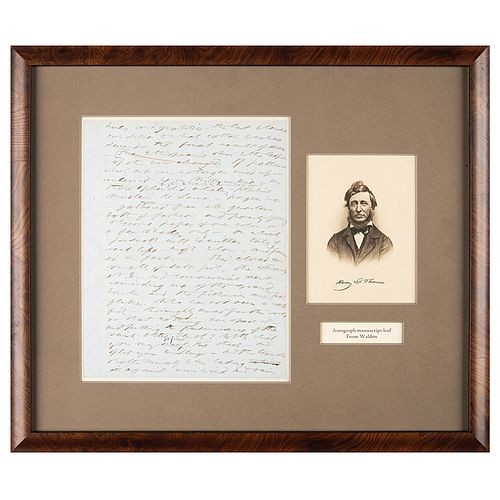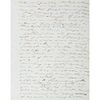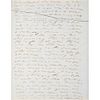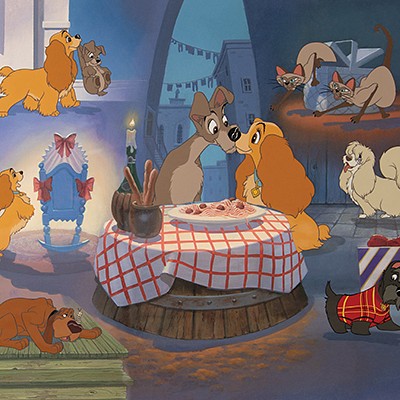Henry David Thoreau Handwritten Manuscript from 'Walden'
Two ways to bid:
- Leave a max absentee bid and the platform will bid on your behalf up to your maximum bid during the live auction.
- Bid live during the auction and your bids will be submitted real-time to the auctioneer.
Bid Increments
| Price | Bid Increment |
|---|---|
| $0 | $5 |
| $50 | $10 |
| $200 | $25 |
| $500 | $50 |
About Auction
Mar 13, 2024
RR Auction's March 2024 Fine Autographs and Artifacts auction features 650+ rare and remarkable items. The sale is highlighted by a robust selection of original animation artwork, including Eyvind Earle's remarkable landscape panoramas, Mary Blair's whimsical concept paintings, and production cels from Walt Disney classics like Snow White, Pinocchio, Lady and the Tramp, Peter Pan, and Cinderella. RR Auction support@rrauction.com
- Lot Description
Significant handwritten manuscript by Henry David Thoreau from the draft for his masterpiece, Walden, containing an extensive passage from the chapter 'Sounds,' one page both sides, 7.5 x 9.75, penned at Concord, Massachusetts, circa 1854. This autograph manuscript leaf is part of a larger passage where Thoreau discusses how the railroad on the other side of Walden Pond connects him to a larger world, commenting on the commerce supported by the train tracks. The leaf, written in both ink and pencil on both recto and verso—with passages that are in the manuscript but not in the final published form in brackets, and text in the final published form but not in this manuscript in bold—reads, in full:
"...hues and qualities, the [last and] lowest condition to which cotton and linen [calico] descend, the final result of dress, [The Ethiopian's skin and the leopard's spots now changed. (note: crossed out in red)]—of patterns which [one wore and] are now no longer cried up, unless it be in Mil[l]waukie, as those splendid articles, English, French, or [and] American prints [note: italicized in pencil in manuscript], [poplins, muslein de Laine] ginghams, muslins, &c., longer are gathered from all quarters both of fashion and poverty, going to become paper of one color or a few shades only, on which forsooth will be written tales of real life, high and low, and founded on fact! This closed car smells of salt fish, the strong [N.E.] New England and commercial scent, reminding me of the Grand Banks and the fisheries [and fish flakes]. Who has not seen a salt fish, thoroughly cured for this world, so that nothing can spoil it, and putting the perseverance of the saints to the blush? with which you may sweep or pave [note: inserted in pencil in manuscript] the streets, and split your kindlings, and the teamster shelter himself and his lading [note: two words crossed out in manuscript] against sun wind and rain behind it,—and the trader, as a Concord trader once did, hang it up by his door for a sign when he commences business, until at last his oldest customer cannot tell surely whether it be animal, vegetable, or mineral, and yet it shall be as pure as a snowflake (note: inserted in pencil in manuscript), and if it be put into a pot and boiled, will come out an excellent dun fish for a Saturday's dinner. Next Spanish hides, with the tails still preserving their twist and the angle of elevation they had when the oxen that wore them were careering over the pampas of the Spanish main,—a type of all obstinacy, and evincing how almost hopeless and incurable are all constitutional vices. I confess, that practically speaking, when I have learned a man's real disposition [and character], I have no hopes of changing it [them] for the better or worse in this state of existence. As the Orientals say, ‘A cur's tail may be warmed, and pressed, and bound round with ligatures, and after a twelve years' labor bestowed upon it, still it will retain its natural form.’ The only effectual..."
The page has been professionally inlaid into a slightly larger sheet, matted with a portrait, and archivally framed under Tru Vue Museum Glass to an overall size of 18 x 15.25; a window in the backing displays the opposite side. In fine condition. Thoreau's Walden has become one of the enduring works of 19th-century American literature—a philosophical exploration of nature, manly self-reliance, and a life modeled on simplicity. In Gifts of Genius: Treasures of the Huntington Library, James Thorpe observes: 'Thoreau's Walden occupies a special place in our American heritage. Moreover, the book is still alive and vibrant, and it reaches out to touch the life of each one of us who is receptive... it has come to be thought a central document in the American experience.' - Shipping Info
-
Bidder is liable for shipping and handling and providing accurate information as to shipping or delivery locations and arranging for such. RR Auction is unable to combine purchases from other auctions or affiliates into one package for shipping purposes. Lots won will be shipped in a commercially reasonable time after payment in good funds for the merchandise and the shipping fees are received or credit extended, except when third-party shipment occurs. Bidder agrees that service and handling charges related to shipping items which are not pre-paid may be charged to a credit card on file with RR Auction. Successful international Bidders shall provide written shipping instructions, including specified Customs declarations, to RR Auction for any lots to be delivered outside of the United States. NOTE: Declaration value shall be the item’(s) hammer price and RR Auction shall use the correct harmonized code for the lot. Domestic Bidders on lots designated for third-party shipment must designate the common carrier, accept risk of loss, and prepay shipping costs.
-
- Buyer's Premium



 EUR
EUR CAD
CAD AUD
AUD GBP
GBP MXN
MXN HKD
HKD CNY
CNY MYR
MYR SEK
SEK SGD
SGD CHF
CHF THB
THB






